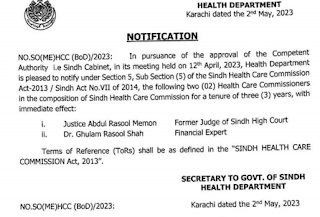Medical oversight body hobbled by vacancies
By Mukhtar Alam
KARACHI: Years after its inception under Sindh government legislation, the provincial healthcare watchdog continues to face challenges, with its board of commissioners currently operating with two vacant positions, including a representative nominated by the Chief Minister, it has emerged.
A source in the health circles emphasised that the existing Board of Commissioners (BoC) of the Sindh Healthcare Commission (SHCC), which started functioning with an incomplete composition in September 2023, is still working with a “limited wisdom.”
The board is meeting routinely for agenda matters and policy decisions, pending nominations of two replacement members, the source noted. The SHCC had previously functioned without a BoC for about one and a half years, hindering major advancements by the statutory autonomous body.
The interim provincial government had taken notice of the deferment, reportedly causing delays in disposal of cases of medical dishonesty, public grievances against various hospitals and clinics, as well as appointments of major officers and implementation of policy decisions. It ensured the final notification of two members in the composition of BoC in May 2023.
However, the SHCC's new BoC, the third in number, fell short again of two members since its initial official working. The current members include Chairman Dr Khalid H Sheikh, alongside Dr Abdul Ghafoor Shoro, Dr Mirza Ali Azhar, Prof Sameer Qureshi, Prof Shoaib Gangat, Dr Sajjad Siddiqui, and Syed Ghulam Rasool Shah, a financial expert nominated by the CM.
In January 2024, SHCC Chief Executive Officer Dr Ahsan Qavi Siddiqi wrote to the secretary of the health department about the vacancies, requesting him to ensure commencement of the process leading to the nomination of two vacant positions to meet the statutory provisions of having a BoC of nine members.
Authorities were duly updated that the slot of a member, a retired justice, nominated by the chief minister, was vacant as he tendered his resignation to the health secretary at least three months before the formal meeting of the ensuing SHC body. Another member, who had also contested for the post of Chairman, did not turn up after the first meeting.
Another source expressed apprehension that the neglect on the part of authorities may add to the miseries of SHCC, keenly observing that obviously SHCC's importance appears undermined. In the given composition of the board, only four like-minded commissioners can get any resolution passed or rejected, against the original requirement of at least five votes from a forum of nine.
When inquired about the inordinate delay in filling the BoC slots, Secretary of the Sindh Health Department, Rehan Iqbal Baloch, told this scribe, "Remaining positions would be filled soon; the process takes its normal time."
SHCC CEO Dr Siddiqi, also the secretary of the Board of Commissioners, informed this scribe that the competent authorities were being regularly updated on the matter. He mentioned that while seven members are operational against the sanctioned strength of nine, they are still meeting the quorum requirement. Sometimes, they have to proceed with five members, but the principle of "majority decision" is strictly adhered to.
Under the SHCC Act 2013, the government notifies the BoC consisting of nine commissioners—seven are nominated on the recommendation of a notified committee, with the provincial health minister as its chairperson, while it nominates a former Judge of the Sindh High Court and a financial expert as commissioners.
“In case of a casual vacancy of a Commissioner, Government shall appoint a person as Commissioner in accordance with the provisions of section 5 for the remainder of the term of the Commissioner, who has died, resigned or disqualified under this Act,” the SHCC Act 2013 reads.
BoC group photo courtesy: SHCC website.








Comments
Post a Comment